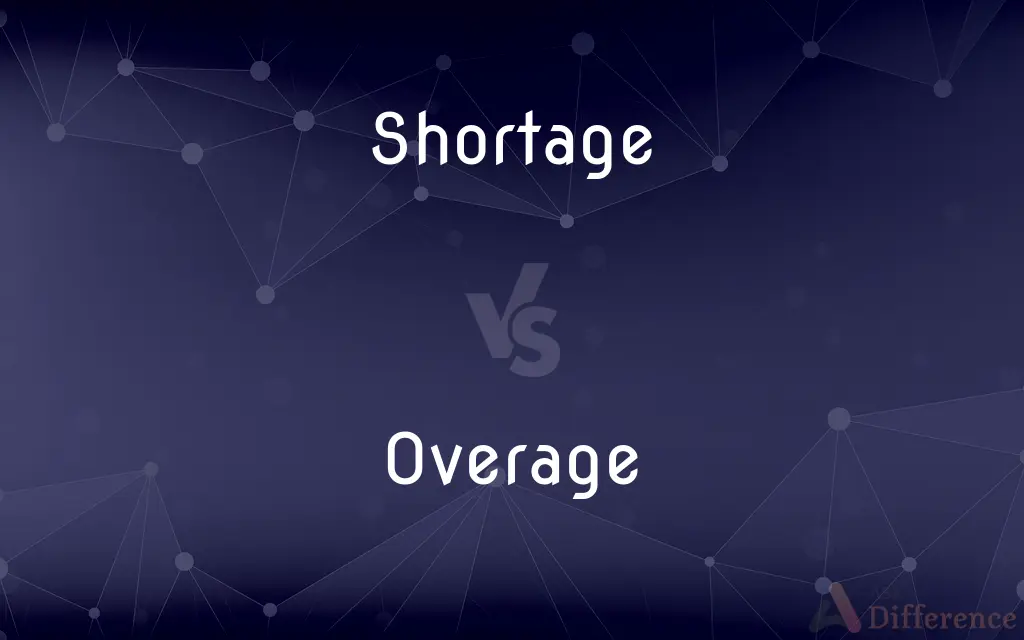Shortage vs. Overage — What's the Difference?
Edited by Tayyaba Rehman — By Maham Liaqat — Updated on April 2, 2024
Shortages occur when demand exceeds supply, leading to scarcity, whereas overages happen when supply surpasses demand, resulting in excess.

Difference Between Shortage and Overage
Table of Contents
ADVERTISEMENT
Key Differences
Shortages arise in situations where the demand for a product or service exceeds the available supply, leading to scarcity and often, increased prices. On the other hand, overages occur when there is more supply than demand, which can lead to surplus inventory and sometimes, reduced prices.
While shortages can lead to competition among consumers and higher costs, overages often result in the need for businesses to discount products or services to reduce excess stock. This dynamic demonstrates the balance between supply and demand that governs market conditions.
In the context of inventory management, a shortage means that a company does not have enough stock on hand to meet customer demand, potentially losing sales and customer satisfaction. Conversely, an overage indicates that a company has more stock than needed, tying up capital in unsold inventory and increasing storage costs.
Shortages can prompt businesses to increase production or sourcing efforts to meet demand, whereas overages might lead companies to slow down production or find alternative ways to offload excess products, such as through sales or discounts.
The impact of shortages and overages extends beyond just inventory and pricing strategies; they also influence company profitability, customer loyalty, and market dynamics. Effective management of these conditions is crucial for business success and market stability.
ADVERTISEMENT
Comparison Chart
Definition
A situation where demand exceeds supply.
A situation where supply exceeds demand.
Impact on Prices
Generally leads to higher prices.
Often results in lower prices or discounts.
Effect on Businesses
Can result in lost sales and unhappy customers.
Leads to excess inventory and increased storage costs.
Response Strategies
Increase production/sourcing.
Slow down production, sales, or discounts.
Market Dynamics
Can cause competition among consumers.
May result in wasted resources or need for clearance sales.
Compare with Definitions
Shortage
A deficit in available goods or services compared to demand.
The drought led to a shortage of water supplies in the region.
Overage
Surplus amount that exceeds the planned inventory levels.
The store’s overage of winter coats will be sold at a discount.
Shortage
Lack of sufficient resources to meet needs.
The rapid growth of the city has caused a housing shortage.
Overage
An excess of supply over demand, leading to surplus.
The overage of solar panels has driven prices down significantly.
Shortage
A situation where the demand outstrips the supply.
The surge in demand for face masks created a temporary shortage.
Overage
A condition where goods remain unsold, increasing storage costs.
The overage of perishable goods is a concern for the grocery store.
Shortage
A condition leading to increased prices due to scarcity.
The wheat shortage has caused bread prices to skyrocket.
Overage
A scenario causing potential wastage or need for markdowns.
The festival’s overage of promotional items will be donated to local schools.
Shortage
Insufficiency that affects operational efficiency.
The shortage of skilled workers is hindering the project's progress.
Overage
The result of overproduction or lower than expected demand.
The overage in smartphone production has led to heavy discounts.
Shortage
In economics, a shortage or excess demand is a situation in which the demand for a product or service exceeds its supply in a market. It is the opposite of an excess supply (surplus).
Overage
An amount, as of money or goods, that is actually on hand and exceeds the listed amount in records or books.
Shortage
A deficiency in amount; an insufficiency.
Overage
A surplus; an excess.
Shortage
A lack or deficiency; an insufficient amount.
Overage
Beyond the proper or required age.
Shortage
Amount or extent of deficiency, as determined by some requirement or standard; as, a shortage in money accounts.
Overage
Older than usual for a particular position or activity.
Shortage
The property of being an amount by which something is less than expected or required
Overage
Too old to be of use or service
An overage vehicle.
Shortage
An acute insufficiency
Overage
Having an age that is greater than a stipulated minimum.
Overage
Too old to be of use in a particular situation.
Overage
To have too long an aging process.
Overage
A surplus of inventory or capacity or of cash that is greater than the amount in the record of an account.
Overage
A state of being more than one ought to be.
You're entitled to bring a bag weighing fifty pounds onto the airplane, and will be charged extra for any overage.
Overage
(property law) Any additional sums payable following the purchase of land, calculated on a prearranged basis, on the occurrence of certain specified events that are deemed to increase the value of that land; usually in the context of the development and further sale of that land.
Overage
Too old to be useful;
He left the house...for the support of twelve superannuated wool carders
Common Curiosities
What strategies can businesses use to manage shortages?
Businesses may increase production, find alternative suppliers, or raise prices to manage shortages.
What is an overage?
An overage occurs when the supply of a product or service exceeds the demand for it.
How do shortages and overages affect prices?
Shortages often lead to higher prices due to increased competition for limited resources, while overages can cause prices to fall as sellers try to reduce excess inventory.
What impact do shortages have on consumers?
Shortages can lead to frustration and increased costs for consumers as they compete for limited resources.
What is a shortage?
A shortage is a situation where the demand for a product or service exceeds the available supply.
How can overages be addressed by companies?
To address overages, companies might slow down production, hold sales or discounts, or find alternative markets to reduce surplus stock.
Why are shortages and overages significant in economics?
They illustrate the principles of supply and demand, affecting market equilibrium, pricing, and resource allocation.
What role does inventory management play in preventing overages and shortages?
Effective inventory management helps businesses forecast demand accurately and adjust supply levels to prevent overages and shortages.
What factors can lead to a shortage?
Factors like increased demand, supply chain disruptions, and natural disasters can lead to shortages.
How do shortages and overages affect competition?
Shortages can intensify competition among buyers, while overages may lead to competitive pricing and sales strategies among sellers.
What are the consequences of overages for retailers?
Retailers facing overages may experience financial strain due to unsold stock and increased storage costs.
How do shortages affect economic growth?
Persistent shortages can hamper economic growth by limiting the availability of essential goods and services.
Can shortages and overages coexist in different markets?
Yes, it's possible for shortages to exist in one market while overages occur in another, depending on supply and demand dynamics.
Why might a business intentionally create an overage?
A business might create an overage to take advantage of bulk production savings or to prepare for an anticipated increase in demand.
Can overages lead to waste?
Yes, overages, especially of perishable goods, can lead to waste if the surplus products are not sold in time.
Share Your Discovery

Previous Comparison
Marsh vs. Wetland
Next Comparison
Status vs. PrestigeAuthor Spotlight
Written by
Maham LiaqatEdited by
Tayyaba RehmanTayyaba Rehman is a distinguished writer, currently serving as a primary contributor to askdifference.com. As a researcher in semantics and etymology, Tayyaba's passion for the complexity of languages and their distinctions has found a perfect home on the platform. Tayyaba delves into the intricacies of language, distinguishing between commonly confused words and phrases, thereby providing clarity for readers worldwide.
















































